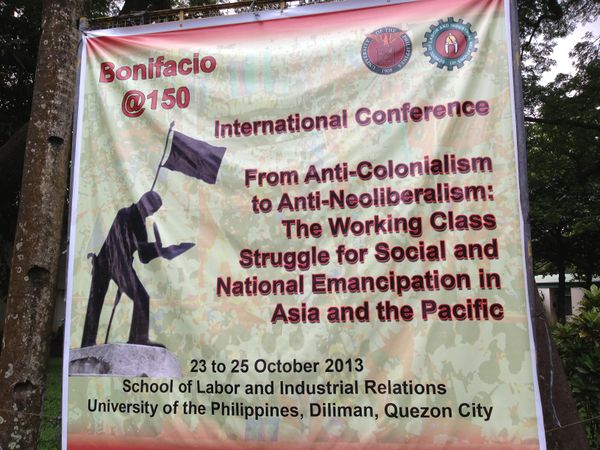Bonifacio@150: Difference between revisions
Rsmoralejo (talk | contribs) No edit summary |
|||
| Line 11: | Line 11: | ||
==Directory== | ==Directory== | ||
[[File:BoniAt150.JPG| | [[File:BoniAt150.JPG|600px]] | ||
Bonifacio was the son of Santiago Bonifacio and Catalina de Castro in Tondo, Manila, and he was the eldest of five children. His siblings were Ciriaco, Procopio, Troadio, Esperidiona and Maxima. His father was a tailor who served as a teniente mayor of Tondo, Manila, while his mother was a mestiza born of a Spanish father and a Filipino-Chinese mother who worked at a cigarette factory. As was custom, upon baptism he was named for the saint on whose feast he was born, Andrew the Apostle. | Bonifacio was the son of Santiago Bonifacio and Catalina de Castro in Tondo, Manila, and he was the eldest of five children. His siblings were Ciriaco, Procopio, Troadio, Esperidiona and Maxima. His father was a tailor who served as a teniente mayor of Tondo, Manila, while his mother was a mestiza born of a Spanish father and a Filipino-Chinese mother who worked at a cigarette factory. As was custom, upon baptism he was named for the saint on whose feast he was born, Andrew the Apostle. | ||
Revision as of 15:26, 17 September 2013
Bonifacio@150
From Anti-Colonialism to Anti-Neoliberalism: The Working Class Struggle for Social and National Emancipation in Asia and the Pacific
Intro
School of Labor and Industrial Relations
Program
Directory
Bonifacio was the son of Santiago Bonifacio and Catalina de Castro in Tondo, Manila, and he was the eldest of five children. His siblings were Ciriaco, Procopio, Troadio, Esperidiona and Maxima. His father was a tailor who served as a teniente mayor of Tondo, Manila, while his mother was a mestiza born of a Spanish father and a Filipino-Chinese mother who worked at a cigarette factory. As was custom, upon baptism he was named for the saint on whose feast he was born, Andrew the Apostle.
Bonifacio's normal schooling was cut short when he dropped out to support his siblings after both their parents died of illness. He sold canes and paper fans he made himself and made posters for business firms. In his late teens, he worked as a mandatorio for the British trading firm Fleming and Company, where he rose to become a corregidor of tar, rattan and other goods. He later transferred to Fressell and Company, a German trading firm, where he worked as a bodeguero (storehouse worker). Bonifacio was also a part-time actor who performed in moro-moro plays.
Not finishing his normal education, Bonifacio was self-educated. He read books about the French Revolution, biographies of the Presidents of the United States, books about contemporary Philippine penal and civil codes, and novels such as Victor Hugo's Les Misérables, Eugène Sue's Le Juif errant and José Rizal's Noli Me Tángere and El Filibusterismo. Aside from Tagalog and Spanish, he could speak a little English, which he learned while working at J.M. Fleming and Co.
Bonifacio was married twice: first to a certain Monica who died of leprosy; then he married Gregoria de Jesús of Caloocan in 1893. They had one son named Andrés who died of smallpox in infancy
In 1892 he joined Rizal's La Liga Filipina, an organization which called for political reforms in Spain`s colonial government of the Philippines. However, La Liga disbanded after only one meeting as Rizal was arrested and deported to Dapitan in Mindanao. Bonifacio, Apolinario Mabini and others revived La Liga in Rizal's absence and Bonifacio was active at organising local chapters in Manila. La Liga Filipina contributed moral and financial support to the Propaganda Movement of Filipino reformists in Spain.



